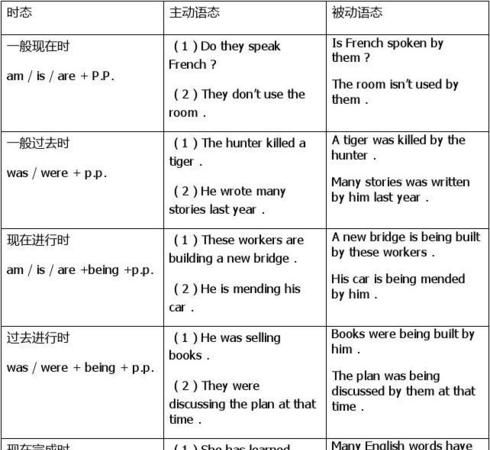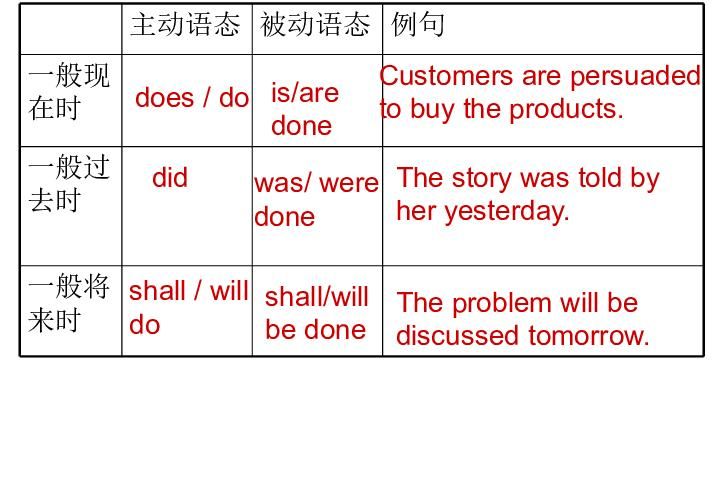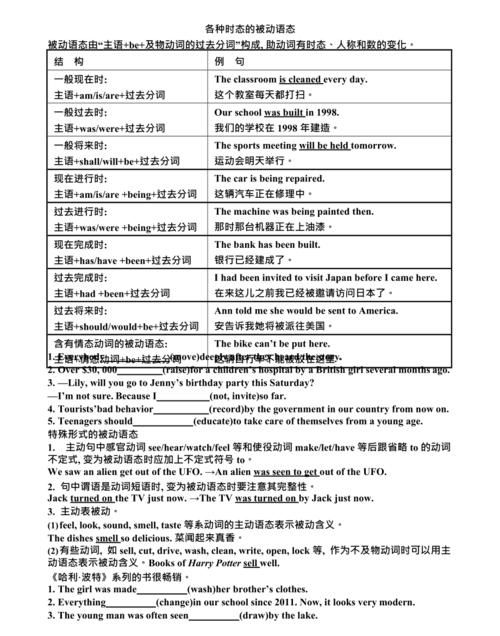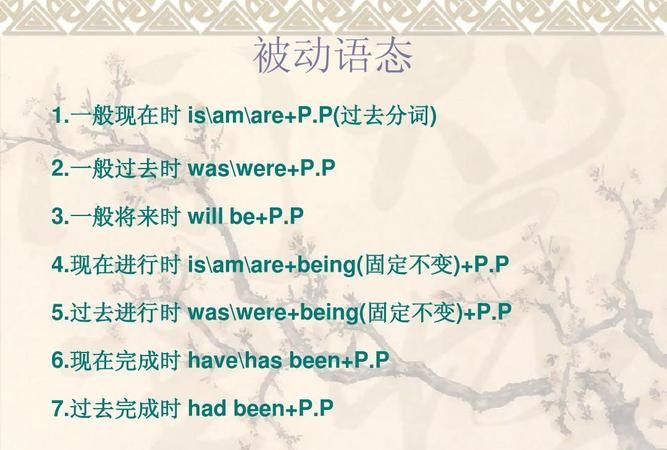本文目录
什么是被动语态
被动语态是指主语是动作的承受者,被动语态的句子是以《be动词+过去分词》的形式来表达,如果要特别强调动作或行为的执行者时,句子后面需接by~,译为“被(由)……”。
1 被动语态的句型
肯定句:主语+be +过去分词+(by~).
否定句:主语+be not +过去分词+(by~).
一般疑问句:Be +主语+过去分词+(by~)?
特殊疑问句:疑问词+be +主语+过去分词+(by~)?
被动语态的时态是由be的时态决定的,be是什么时态,全句就是什么时态,be动词后面的过去分词不变。
一、 被动语态的用法:
1. 一般现在时的被动语态构成:is / am / are + 及物动词的过去分词 Our classroom is cleaned everyday.
I am asked to study hard.
Knives are used for cutting things.
2. 一般过去时的被动语态构成:was / were + 及物动词的过去分词 A new shop was built last year.
Dinosaur eggs were laid long long ago.
3. 一般将来时的被动语态构成:will+ be + 及物动词的过去分词
A new hospital will be built in our city.
Many more trees will be planted next year.
4. 现在进行时的被动语态构成:am / is / are + being + 及物动词的过去分词
Uncle Wang is mending my bike now.→
My bike is being repaired by Tom now.
They are planting trees over there. →
Trees are being planted over there by them.
5. 现在完成时的被动语态构成:has / have + been + 及物动词的过去分词
This book has been translated into many languages.
Many man-made satellites have been sent up into space by many countries.
6.过去进行时的被动语态构成:was/were + being + 及物动词的过去分词
The boy was being operated on when his parents hurried to the hospital. The new road was being made.
7.过去完成时的被动语态构成:had + been + 及物动词的过去分词 The classroom hadn’t been cleaned before the teacher came. The tickets had been sold out berore I came to the cinema.
8.将来完成时的被动语态构成:shall/will + have done
They will have been married for 20 years by then.
The project will have been completed before May.
9.含有情态动词的被动语态构成:情态动词+ be + 及物动词的过去分词 Young trees must be watered often.
Your mistakes should be corrected right now.
The door may be locked inside.
Your homework can be handed in tomorrow.
二、 怎样把主动语态改成被动语态?
把主动语态改为被动语态非常简单,可以遵循以下几个步骤:
1. 先找出谓语动词;
2. 再找出谓语动词后的宾语;
3. 把宾语用作被动语态中的主语;
4. 注意人称、时态和数的变化。
例:1. Bruce writes a letter every week. →A letter is written by Bruce every week.
2. Li Lei mended the broken bike this morning.→The broken bike was mended by Li Lei this morning.
3. He has written two novels so far.→Two novels have been written by him so far.
4. They will plant ten trees tomorrow.→Ten trees will be planted by them tomorrow.
5. Lucy is writing a letter now.→A letter is being written by Lucy now.
6. You must lock the door when you leave.→the door must be locked when you leave.
三、 使用被动语态应注意的几个问题:
1. 不及物动词无被动语态。
What will happen in 100 years.
The dinosaurs disappeared about 65 million years ago.
2. 有些动词用主动形式表示被动意义。
This pen writes well.
This new book sells well.
3. 感官动词或使役动词使用省略to的动词不定式,主动语态中不带to ,但变为被动语态时,须加上to 。
例:make somebody do something→somebody+ be +made to do something
see somebody do something→somebody +be +seen to do something A girl saw my wallet drop when she passed by.→My wallet was seen to drop by a girl when she passed by.
The boss made the little boy do heavy work.→The little boy was made to do heavy work by the boss.
4. 如果是接双宾语的动词改为被动语态时,直接宾语(物)作主语,那么动词后要用介词,这个介词是由与其搭配的动词决定。
He gave me a book.→A book was given to me by him.
He showed me a ticket.→A ticket was shown to me by him.
My father bought me a new bike. →A new bike was bought for me by my father.
5. 一些动词短语用于被动语态时,动词短语应当看作一个整体,而不能丢掉其中的介词或副词。
We can’t laugh at him. →He can’t be laugh at by us.
He listens to the radio every day. →The radio is listened to by him every day.
The nurse is taking care of the sick man. →The sick man is being taken care of by the nurse.

英语中的被动语态解释和形式,用法
1-1 当句子的主语为动作的承受者即受动者,动词用被动语态.
Eg. John helped Peter. (John是动作的施行者,而Peter是动作的承受者即承受者.)
Peter was helped by John. (Peter是句子的主语,而且是动作的承受者,所以用被动语态.)
1-2 被动语态的构成:be + 动词的过去分词
2. 特别提醒:被动语态的时态和人称的变动都是由动词be作改变的,不论发生什么改变,动词的过去分词(v+ed或不规则的分词) 都不改变.时态用的助动词和人称代词由被动语态句子中的主语,即动作的承受者,所决定.
2-1 Eg. He cleans the room everyday.
The room is cleaned (by him) everyday.
(一般现在时的被动语态构成: is / am / are + 动词的过去分词)
2-2 Eg. They have brought many toys since last week.
Many toys have been brought (by them) since last week.
(现在完成时的被动语态构成:has/have + been + 动词过去分词.)
2-3 Eg. They are meeting the foreigners at the gate.
The foreigners are being met (by them) at the gate.
(现在进行时的被动语态构成:is/ are/ am + being + 动词过去分词)
2-4 Eg. They will build some new buildings next year.
Some new buildings will be built (by them) next year.
They are going to draw a new picture tomorrow.
A new picture is going to be drawn tomorrow.
(一般将来时被动语态构成:will + be +动词过去分词, 或is/am/are going to +be + 动词过去分词)
2-5 Eg. Father has been painting the room all morning.
The room has been being painted (by father) all morning.
(仅作了现在完成进行时的被动语态:has/ have + been+ being + 动词过去分词)
2-6 Eg. They wrote the book last year.
The book was written (by them) last year.
(一般过去时的被动语态构成:was/ were+动词过去分词)
2-7 Eg. The children had broken the window when the teacher arrived.
The windows had been broken (by the children) when the teacher arrived.
(过去完成时被动语态构成had + been + 动词过去分词.)
2-8 Eg. She was reading the book at 8:00 last night.
The book was being read at 8:00 last night.
(过去进行时被动语态构成:was/ were being + 动词过去分词)
2-9 Eg. They said they would cook some food.
They said some food would be cooked.
They said he was going to buy a new house.
They said a new house was going to be bought.
(过去将来时被动语态构成:would +动词过去分词,或:was/were going to be + 动词分词)
2-10 Eg. He must finish the work in two days.
The work must be finished in two days.
(情态动词被动语态:must/have to/had better/ should/can/could/may/might/need to + be +动词分词)
3. 间接引语中的被动语态:
3-1 引述动词是一般现在时的时候,引语的人称根据引述动词前面的主语而作调整,但时态不变.
Eg. He often says, “ I was chosen to take part in the exam when I was twelve.”
He often says he was chosen to take part in the exam when he was twelve. (人称由引述动词says前面的主语he 决定,但引语的时态不变.)
3-2 引述动词为过去时态,引语部分的时态和人陈都按照引述部分进行改变.
Eg. He said, “ My father has been hit by a car.”
He said his father had been hit by a car. (引语部分的时态和人称都发生了改变.)
3-3 从上文可看出:引述动词是过去时态时,被动语态形式的引语改动规则与主动语态形式的引语的改动规则一样,但无论如何,只要是被动语态,它的动词的过去分词总是不改的.)
4.几种特殊的情况需要特别注意:
4-1. 带介词的双宾语可以有两种改法:
eg. They gave him an apple.
He was given an apple.
An apple was given to him. (双宾语中当直接宾语apple 作被动语态句子的主语时,要记得写上介词to.)
4-1-1这样的动词有:buy/make/cook sth for sb
或:show/bring/give/take/ send/write/… to sb.
4-2. 多词动词的被动语态:
eg. She looked after his children.
His children were looked after (by her).
4-2-1这样的动词有:look after, look into, talk about, set up, put off, bring about, do away with, look forward to, take good care of 等等词.
4-3 It is/was/has been said/reported/known + that + 从句
4-4 有些动词在主动语态里不带to,但改为被动语态时要还原to
make/see/have/hear/let sb do sth sb be made/seen/heard/let to do sth
eg. The boss made the workers work for a long time.
The workers were made to work for a long time (by the boss).
4-5 有些动词在主动语态中带sb doing sth, 改为被动语态时仍用doing sth
eg. I heard him singing in his room. He was heard singing in his room.
4-6 特别区分:当句子中出现suddenly, 具体的时间时,用see/hear sb doing sth的形式
当句中出现often, always, sometimes, 或不具体的时间时,用see/hear sb do sth的形式.
Eg. 1) I often hear him sing in his room.
2) Yesterday I saw him cross the road.
3) Suddenly they heard someone crying in the forest.
4-7 不及物动词没有被动语态:happen, take place, begin, become, go, come
eg. Great changes have taken place in the last two years.
4-8 表静态的动词没有被动语态:cost, last, agree with, own
4-9 主动形式表示被动意义,通常用于表示sth的功能或效用: write/wash/cut/use/sell/cook
eg. The cooker cooks well.
The washing machine washes well.
注意:动词的搭配:
1.带sb to do sth的动词:allow/encourage/help/want/wish/ask/tell sb to do sth,
2.带 to do sth 的动词:hope/agree/decide/want/wish/prefer to do sth
3.带 doing sth 的动词:enjoy/practise/think about/doing sth
4.几对特殊的例子:remember to do sth (记得要做,但还没做)
remember doing sth (记得要做,而且做了)
forget to do sth ( 忘记要做,没有做)
forget doing sth ( 做了,但忘记已经做了)
5.prefer doing sth to doing sth
6.look forward to doing sth
7.介词后面用doing sth
8.动词做句子的主语时用ing形式:Collecting stamps is interesting

使用被动语态的意义
英语动词有两种语态:主动语态和被动语态。主动语态表示主语是动作的执行者,被动语态表示主语是动作的承受者。如:
Many
people
speak
English.(主动语态)
English
is
spoken
by
many
people.(被动语态)
1.被动语态的构成
由于不及物动词不能带宾语,故无被动语态,只有及物动词或相当于及物动词的动词短语才有被动语态,其基本构成方式是“助动词be+过去分词”。
注意:“be+过去分词”结构不一定都是被动语态,有些动词(如
be,feel,look,seem等)后面的过去分词已转化为形容词,用作表语表示状态。如:
My
bike
is
broken.(我的自行车坏了。)
The
door
is
open.(门开了。)
2.主动语态改被动语态的方法
1)将主动语态改为被动语态应注意以下三个方面:①将主动语态的宾语改为被动语态的主语;②将主动语态的谓语动词改为“be+过去分词”结构;③将主动语态的主语改为介词by之后的宾语,放在谓语动词之后(有时可省略)。
2)含直接宾语和间接宾语的主动语态改为被动语态时有两种情况:①把间接宾语改为被动语态的主语,直接宾语仍保留原位;②把直接宾语改为主动语态的主语,此时,间接宾语前要加介词to或
for。如:
He
gave
the
boy
an
apple.→The
boy
was
given
an
apple.(或An
apple
was
given
to
the
boy.)
Her
father
bought
her
a
present.→She
was
bought
a
present
by
her
father.(或A
present
was
bought
for
her
by
her
father.)
3)不带to的动词不定式作宾语补足语的主动语态,改为被动语态时不定式前要加to。如:
They
watched
the
children
sing
that
morning.→The
children
were
watched
to
sing
that
morning.
4)带复合宾语的动词在改为被动语态时,一般把主动语态的宾语改为主语,宾语补足语在被动语态中作主语补足语。如:
We
call
him
Xiao
Wang.→He
is
called
Xiao
Wang.
He
cut
his
hair
short.→His
hair
was
cut
short.
They
told
him
to
help
me.→He
was
told
to
help
me.

被动语态的用法及不能使用被动语态的情况
1、助动词be+及物动词的过去分词。
2、情态动词+be+及物动词的过去分词。
3、被动语态表示主语是动作的承受者。被动语态是动词的一种特殊形式,一般来说,只有需要动作对象的及物动词才有被动语态。汉语往往用被受给等被动词来表示被动意义 。被动语态由“助动词be+及物动词的过去分词”构成。被动语态的时态变化只改变be的形式,过去分词部分不变。

以上就是关于被动语态的意义和用法,什么是被动语态的全部内容,以及被动语态的意义和用法 的相关内容,希望能够帮到您。

